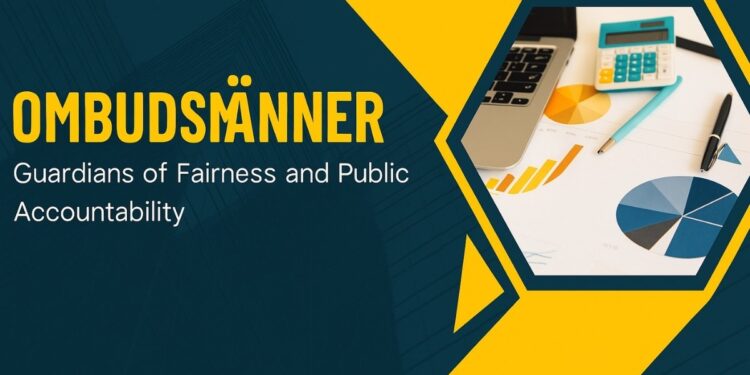In a world increasingly demanding transparency, justice, and fairness in governance and organizational behavior, one often-overlooked institution plays a crucial behind-the-scenes role: the office of the Ombudsmänner. While many are unfamiliar with the term, Ombudsmänner are essential figures working to protect individual rights, resolve conflicts, and hold institutions accountable. Their role is not only critical in government but is rapidly expanding into universities, healthcare, corporations, and international organizations. This article aims to demystify the concept of Ombudsmänner, explore their responsibilities, origins, and challenges, and highlight why their presence is vital in today’s complex societal structure.
The Origin and Evolution of Ombudsmänner
The term “Ombudsmann” (plural: Ombudsmänner) is derived from Swedish, where it first appeared in the early 19th century. The original concept was institutionalized in 1809 in Sweden when the Swedish Parliament created the role of a Parliamentary Ombudsman to monitor the legality and fairness of governmental administration. The Ombudsmann had the authority to investigate complaints from citizens, supervise courts, and ensure civil servants followed the law. Over time, this Scandinavian model inspired other nations to adopt similar roles, modifying them to suit local legal and cultural environments.
Today, exist in various forms around the world. They are known by different names—such as public advocates, grievance officers, or mediators—but their core function remains consistent: to serve as neutral, independent figures that ensure fairness, address complaints, and help resolve conflicts between individuals and powerful institutions.
The Core Functions of Ombudsmänner
An Ombudsmann is primarily a watchdog for justice and fairness. Their core functions include receiving complaints from the public, conducting impartial investigations, making recommendations for action, and reporting their findings to the relevant authorities or the public. Importantly, Ombudsmänner do not usually have the power to enforce legal action or impose penalties. Instead, their strength lies in their ability to influence through reason, authority, and public accountability.
They serve as a non-threatening, informal alternative to litigation, offering confidential spaces for complainants to share grievances. evaluate whether administrative actions have been arbitrary, unfair, or improper and suggest improvements to avoid future occurrences. In doing so, they not only help individuals but also promote better governance and policy-making by identifying systemic flaws.
Ombudsmänner in Government and Public Institutions
In the public sector, Ombudsmänner are essential for maintaining democratic accountability. Citizens often face difficulties when confronting bureaucracies, especially in situations involving complex regulations, delays, or miscommunications. act as an accessible bridge between the public and administrative bodies, empowering individuals to voice concerns without fear of retaliation.
For instance, in countries like Finland, Norway, and the Netherlands, the public ombudsman is a respected figure who can bring government missteps to light. Their investigations often result in formal recommendations to government agencies, which are usually complied with due to the weight the Ombudsmann’s office holds in terms of public trust and moral authority. In some jurisdictions, the Ombudsmann even has a role in whistleblower protection, offering safe channels for reporting corruption or ethical violations.
Ombudsmänner in Corporations and the Private Sector
The role of Ombudsmänner has expanded significantly into corporate environments, especially in large multinational firms. Here, they are responsible for handling internal employee concerns—ranging from workplace harassment and discrimination to ethical violations and whistleblower reports. In such settings, Ombudsmänner provide a confidential, independent space for employees to raise issues they might otherwise suppress due to fear of retaliation.
Companies benefit from this structure by improving employee trust, reducing litigation risk, and promoting ethical corporate culture. The presence of a corporate Ombudsmann signals a commitment to integrity and transparency, fostering a healthier workplace and often contributing to better performance outcomes. Many organizations even require their Ombudsmänner to be certified by professional bodies, ensuring a standard of neutrality and procedural expertise.
Academic and Healthcare Ombudsmänner: Protecting the Vulnerable
In academia and healthcare, Ombudsmänner perform particularly delicate and impactful roles. In universities, student and faculty help resolve disputes related to academic grading, discrimination, bullying, and administrative policies. The power dynamic between students and administration or between junior staff and senior faculty can be intimidating, and provide a voice for those who might otherwise go unheard.
Similarly, in healthcare settings, Ombudsmänner are instrumental in addressing patient complaints, medical errors, and ethical dilemmas. They advocate for transparent communication and patient rights while ensuring that institutional policies do not compromise care or fairness. Their presence improves trust in the healthcare system, reduces patient dissatisfaction, and helps mitigate risks of malpractice lawsuits or reputational harm.
The Importance of Independence and Impartiality
The effectiveness of any Ombudsmann hinges on their independence and impartiality. They must operate free from external pressures—be it from government officials, corporate executives, or institutional hierarchies. To maintain public trust, Ombudsmänner are usually appointed through transparent processes and given statutory protections to shield them from undue influence.
This structural independence allows to be honest brokers in conflict resolution. Their offices are often directly accountable to legislative bodies or oversight boards rather than to the management of the institutions they oversee. This separation helps avoid conflicts of interest and reinforces their credibility among stakeholders, complainants, and the wider public.
Challenges Faced by Ombudsmänner
Despite their value, Ombudsmänner face numerous challenges. One common issue is the lack of enforcement power. While they can recommend solutions and publish reports, their decisions are not legally binding. This can limit their impact, especially in cases where institutions choose to ignore recommendations or delay implementation.
Another challenge lies in public awareness. Many people simply do not know that the Ombudsmann exists or how to access their services. Language barriers, legal complexity, and a general mistrust in systems can deter individuals from seeking help. Moreover, in authoritarian or less democratic regimes, may face political interference or restrictions that undermine their ability to act effectively.
Resource limitations also hinder many Ombudsmänner offices. Understaffed and underfunded departments cannot investigate all complaints promptly, leading to backlogs and reduced efficiency. In such cases, even the most well-intentioned Ombudsmann can become a symbolic figure rather than a practical resource for change.
Digital Era and the Evolution of the Ombudsmann Role
In the digital age, Ombudsmänner are adapting to emerging technological and ethical challenges. Online platforms, data privacy concerns, cyberbullying, and algorithmic bias present new territories for oversight. Ombudsmänner must now address complaints arising in virtual environments, often requiring technical literacy and new regulatory approaches.
Some forward-thinking Ombudsmänner offices have begun using digital tools to streamline complaint intake, conduct remote investigations, and analyze trends using data analytics. In doing so, they not only increase efficiency but also gain insights into systemic problems that may otherwise go unnoticed. The future of the Ombudsmann role will likely involve increased specialization, including tech-specific ombudsman roles focusing on digital rights, AI ethics, and platform accountability.
Why Ombudsmänner Matter More Than Ever
As institutions become larger and more complex, the risks of bureaucratic overreach, systemic injustice, and ethical misconduct grow. Ombudsmänner are uniquely positioned to mitigate these risks through principled intervention. Their role encourages transparency, supports marginalized voices, and helps institutions self-correct without resorting to adversarial processes like lawsuits or protests.
Moreover, in an age of growing public distrust toward institutions—from governments and corporations to universities and healthcare systems—the Ombudsmann offers a reliable mechanism for redress and accountability. Their work builds bridges between the governed and the governing, promoting a healthier, more resilient society grounded in fairness.
Building a Culture of Accountability
The true value of Ombudsmänner lies not only in resolving individual disputes but in helping to cultivate a culture of accountability and ethics. By exposing systemic problems, advocating for change, and fostering dialogue, they contribute to long-term institutional reform. Their presence reminds both public officials and corporate leaders that authority must be exercised responsibly and with consideration for those affected.
For Ombudsmänner to thrive, however, public support and legal protections must be continuously reinforced. Governments and organizations should invest in robust Ombudsman frameworks, ensure independence, and educate the public about how to engage with them. When empowered and properly supported, Ombudsmänner can become pillars of justice and transparency in any democratic society.
Frequently Asked Questions (FAQs)
1. What is the role of an Ombudsmann?
- An Ombudsmann serves as an independent, neutral party who investigates complaints about unfair treatment or administrative misconduct in public or private institutions.
2. Are Ombudsmänner legally binding authorities?
- No, Ombudsmänner generally do not have enforcement power. They can recommend changes and publish findings, but cannot compel action.
3. Where do Ombudsmänner typically work?
- Ombudsmänner operate in various sectors, including government, corporations, universities, healthcare institutions, and international organizations.
4. How do I file a complaint with an Ombudsmann?
- You can typically file a complaint via the Ombudsmann’s website, in writing, or through a formal intake process depending on the institution.
5. Why are Ombudsmänner important in modern society?
- They help protect individuals from institutional injustice, promote transparency, resolve conflicts fairly, and uphold ethical standards in governance and administration.


















